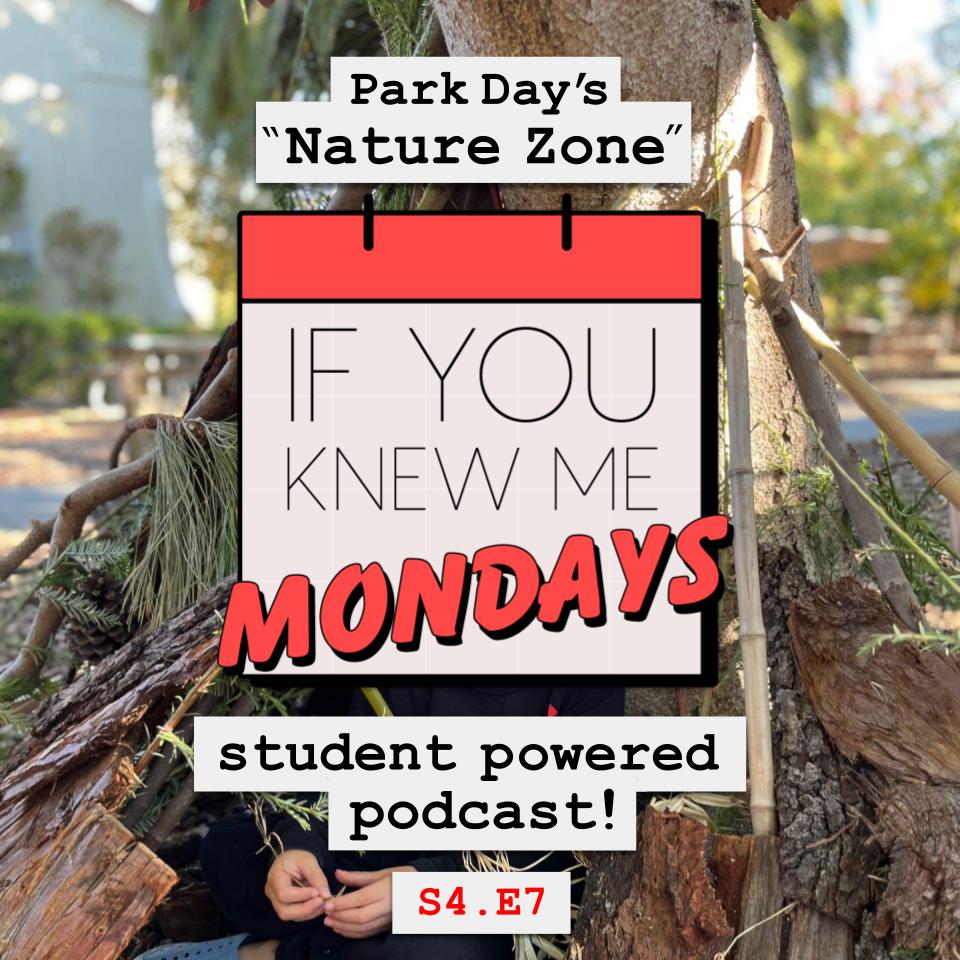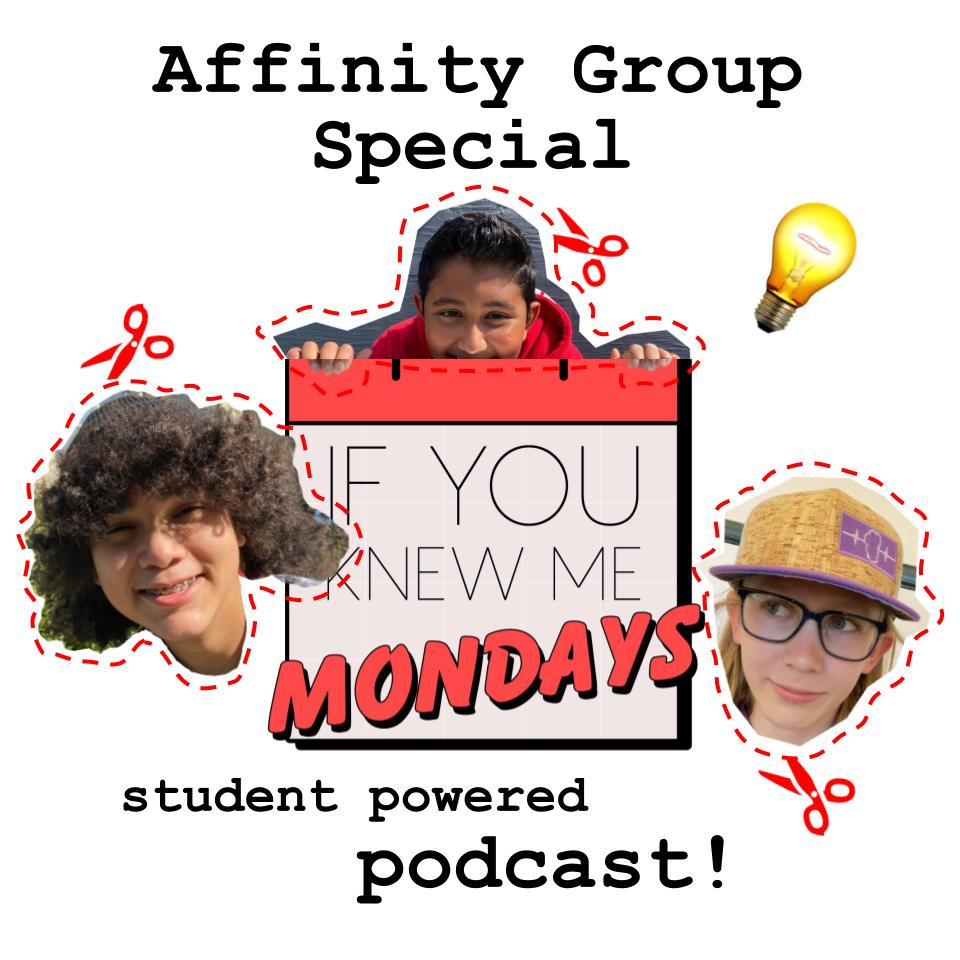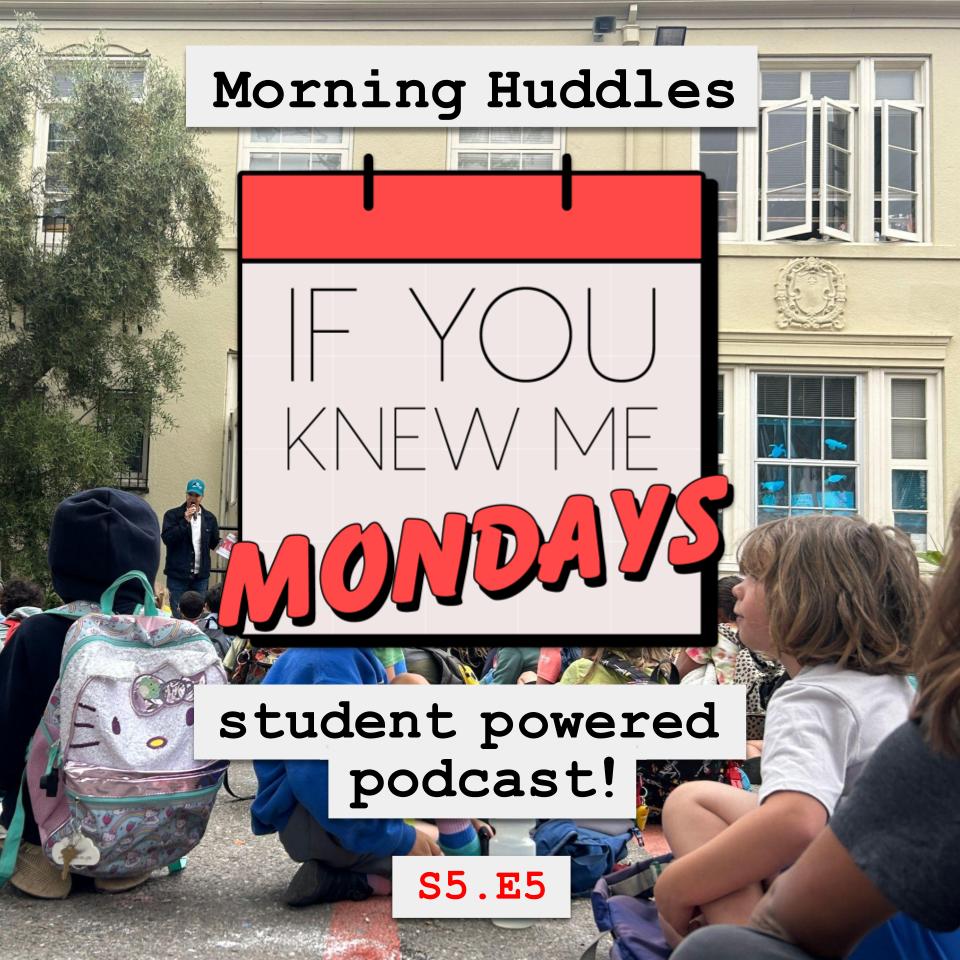Episode Transcript
[00:00:00] Speaker A: If you really knew me? If you really knew me? If you really knew me? If you really knew me, you would know. Hey, who are you?
[00:00:09] Speaker B: Who, me?
[00:00:10] Speaker A: Yeah, you.
[00:00:11] Speaker C: It's Monday.
[00:00:16] Speaker D: Hello and welcome to the latest episode of if you knew me Mondays, a student powered Park Day inspired podcast that builds belonging by sharing stories and perspectives from the margins of our school and community.
[00:00:28] Speaker A: Say what?
[00:00:29] Speaker D: My name is Shay. I'm a 7th grader at Park Day. And if you really knew me, you would know that I'm super excited for the start of spring because I love being outside and hot weather always raises my spirits.
[00:00:41] Speaker E: And I'm Sahana. I'm also a 7th grader at Park Day. And if you really knew me, you'd know that I'm working one of my first jobs this year at a school called Petrie Community School. Speaking of spring, spring is also the season of Holy, a beloved holiday celebrated by millions across the desi, or south asian diaspora.
[00:00:59] Speaker D: Have you ever heard that word before? Diaspora is a term used to describe how a group of people with the same cultural heritage scatter across the world over time.
[00:01:08] Speaker E: For example, even though I'm indian american, I'm one of millions of Indians who don't live in India because my dad moved here years ago and my mom's family moved here before she was even born.
[00:01:19] Speaker D: There are a lot of other diasporic groups around the world who have moved for many other reasons, like colonization, war, or to seek out a better life. Can you think of any of these?
[00:01:30] Speaker E: And the term desi is for a person or group of people whose family comes from India, Pakistan, or Bangladesh, but lives in another country.
[00:01:39] Speaker D: Well, on today's episode, we'll be hearing from a number of Park Day south asian families and about how they celebrate this festive holiday.
[00:01:47] Speaker E: We also made this episode to help you get ready for our schoolwide holy assembly and celebration on Friday, March 29.
[00:01:53] Speaker D: Speaking of getting ready, head over to this episode's padlet and pull out a pencil. There you'll find a reflection sheet to help you track some of the new information and words you learn on this episode.
[00:02:04] Speaker E: Got it? All right, let's get started.
[00:02:10] Speaker D: Let's get started by explaining what Holy is for our friends who don't know, Holy is the celebration of color, meaning that it's celebrated with all the brightest colors you can imagine. Holy is traditionally a hindu holiday, but now people of all ethnic and cultural backgrounds have been celebrating the exciting event. Holy celebrates new beginnings and harmony to forgive and forget and to renew broken relationships. With Holy approaching Park Day families gathered on campus and on Zoom to share stories and perspectives about how their families celebrate this holiday. Up next, here's fourth grader Sahil in conversation with her grandma, who shares stories about how she celebrated Holi growing up in India.
[00:02:56] Speaker F: I'm Sahil. I'm in fourth grade, Sarah's class. And do you want to introduce yourself?
[00:03:02] Speaker C: Sure. I am Jootsna Shah. And I'm Sahil and Anai's grandma. And they call me ba ba.
[00:03:14] Speaker F: Okay, so I have a few questions. The first one is, what do you think holy means for you and your family?
[00:03:25] Speaker C: Holy is in two parts. When I was growing up, we did. First day was holy kad Dahan. That is like, we gather around this big fire like it is in your neighborhood. One fire and people contribute wood and other money to do this big fire. And then also puja, that is prayers, and gather together. And then second day, we do this rangaholi, which is also called duleti. And we do this with colored water on each other or colored powder on each other. And no one feels bad if you put that on stranger. Even then we will say, don't feel bad, it's holy.
[00:04:27] Speaker F: That's really nice. It sounds very community oriented.
[00:04:31] Speaker C: Yes. Also, it is beginning of spring, so we welcome spring like that.
[00:04:38] Speaker D: Also, many people know holy as the festival of color. But as you just heard, it can be so much more. It's a holiday that can unite families and bring friends together. I celebrate holy with my family. And in fact, last year, we even got my dog involved. We put a white shirt on him and threw holy powder at him. He had so much fun running around and jumping through the powder.
[00:05:01] Speaker E: Me, my family, and tons of other families go to Mosswood park to celebrate this wonderful holiday. We begin by drinking mango lussy and eating all the indian sweets we can. Then we begin the extravaganza. Most of my friends have begun a tradition to nail me in the face with as much powder as possible. But be careful, because not everyone enjoys that. Of course, Shay and I aren't the only park day students who celebrate holy. Up next, we'll be hearing from other south asian community members about what holy means to them on our latest segment of the park daily question. We took our field recorder and mic around campus, and here's what students had to share.
[00:05:30] Speaker D: Is this recording?
Yeah, it is.
[00:05:33] Speaker A: Hi, my name is Manali.
And holy to me means celebration and community and joy.
And I really enjoy holy because my community celebrates holy. And I really love watching movies that have holy in them where they spray each other down with a hose and then throw color everywhere. My name's Avi, I'm in second grade, and something I do for holy is go to my friend Aiden's house so we can squirt watercolors on each other.
My name is Sagel, I'm in second grade, and holy means, to me is like, having fun with your family and spending quality time. My favorite part of that is that you get colors and you basically throw them at people. Hi, my name is Sahara. I'm in fourth grade. One way that me and my family celebrate holy is we usually get sweet, and we do rungoli out on our porch. If you don't know what rungoli is, it's colored sand. People spend lots of time making it, and then we put candles.
Hi, my name is Aiden, I'm in fourth grade, and the way my family usually celebrates holy is I usually talk to my grandma or Zoom, call my grandma, and my grandma usually sends me treats from Chicago. My name is Miles, I'm in first grade, and one of my favorite parts of holy is the fireworks. And I like staying up really late, so the fireworks keep me awake.
[00:07:34] Speaker B: My name is Lincoln, and I'm in third grade, and at first, we actually didn't do much about it. We just kind of like, oh, today's holy. And then we have some special indian food for dinner. But now we used to go out to these parks and they do these big holy things, and we throw the pedal around. And this year we're going to go down to Irvine, and with my mom's side of the family, which is mostly indian, we're gonna do a big holy party. Crazy thing.
[00:08:08] Speaker A: Well, my name's Phoenix, I'm in third grade, and most of the time we use powdered stencils and put the powder in to make, like, a design.
And, yeah, we have indian food for dinner most of the time.
[00:08:35] Speaker G: Hi, I'm Sufia, and I'm in 8th grade. A fun holy story is one time when I was really little, I was six years old, and I was with my aunt, and it was after holy, so we're all covered in, like, powder. And, you know, we were filthy, and we were at her house, and she sat on her chair for, like, a solid 20 minutes watching tv with me until she realized it. So we were still covered in powder. And then she had to throw away the chair and she screamed, if you.
[00:08:58] Speaker A: Don'T celebrate holy, I think you should know. You want to get powder, there's a ton of powder. You use it for a lot of stuff with stencils. Are you using it to throw up people so you get all dirty and powder and white clothes so you can see that and, yeah, basically tons of powder.
[00:09:22] Speaker F: It'll be a magical experience.
[00:09:25] Speaker A: Do you know that we're doing it this Friday right here at Park Day?
[00:09:35] Speaker D: That was really cool. And for the first time, I heard such a wide range of park Day students speaking directly about their relationship with holy.
[00:09:43] Speaker E: Did you notice how many of these students mentioned celebrating holy with their family? Lucky for us, we were able to catch up with some of these family members. During the first ever Park Day holy story time, these family gathered together to share intergenerational stories about how they celebrate holy and how it's changed over time and across geography. Here's a snippet of their conversation, starting with third grader Ari and his grandparents.
[00:10:05] Speaker F: Did you ever celebrate holy growing up?
[00:10:08] Speaker H: Yes, I did. When I was growing up in India, we had holy celebration all over the country, and especially in my neighborhood.
And it was such a fun to celebrate with all the family members, all my friends and our neighbors.
[00:10:29] Speaker C: And mostly, this is a festival of Hindus, but the other people also like to celebrate with Hindus. And these are Christians, Jews, Muslims, and almost everybody.
[00:10:48] Speaker I: Being a Muslim in India, did that change your perspective of holy? Like, how did you relate to the holiday even though it wasn't your own religion? You're not know.
[00:11:05] Speaker H: Holy is an indian festival. And being indian, although I'm a proud Muslim, but I'm also proud indian. So to me, it doesn't make any difference if it is a hindu festival, we celebrate with our hindu friends. So I don't think it makes any difference if you are hindu or a Muslim. I mean, you have to participate in all your indian festivals for the goodwill and good wishes.
[00:11:34] Speaker I: Yeah.
[00:11:34] Speaker E: Here's Sahil and their family again.
[00:11:36] Speaker F: What's the story behind why holy is celebrated?
[00:11:40] Speaker C: Holy is celebrated because we had the winning of good over evil. And also, beginning of spring, there was this old story about this rakshasas, that is asuras or bad influence people.
One time, this king had a son who believed in good things and also in God, which they did not like. So they decided to get rid of him by putting him on fire on his aunt's lap.
Because the ant has a boon that she will not be burned in the fire. But the miracle happened, and that child was saved, and the ant was gone and burned by that fire.
That's the story. And the child's name was Prahalad, and the ant's name was Holika.
[00:13:01] Speaker F: Is that why it's called holy?
[00:13:03] Speaker C: Yes.
Now, I have few questions.
What you do at school or in your community to celebrate Holi and the Ranga holy?
[00:13:15] Speaker F: That's a good question. And Anai, my younger sibling who is in kindergarten in Victoria's class, and my mom.
[00:13:25] Speaker I: Hi, I'm Mama to Sahil and Anai.
[00:13:29] Speaker F: And they'll both be answering the question too.
[00:13:35] Speaker I: We've been doing a lot of our holy celebrations at park day.
Coming into the school and reading a book about holy and then getting to do the Duletti part of the celebration where we throw the powder and have some sweets. And it's a little different than when I grew up because I had a lot of uncles and aunties and cousins around me to celebrate and who also observed holy.
And here in the Bay area, we're a little bit far removed from the community I grew up in. So we have been creating our own community or doing it with our family, which is a little bit different. And it evolves every year, actually.
[00:14:26] Speaker F: And yeah, like Anai and my mom said, we'll do a whole thing in the backyard after and we'll just all go ham. And it's really fun. And we basically put powder on our face for a team.
Yeah, once we put powder on our faces and the teams, it was really fun. Yeah, it's chaotic and really fun.
[00:14:53] Speaker I: Thanks for joining us for this conversation.
[00:14:57] Speaker C: I enjoyed it too. And I would like to know how you did it this year after.
[00:15:06] Speaker F: We'll make sure to tell you. Yeah, okay.
[00:15:09] Speaker C: Good luck and have fun.
[00:15:12] Speaker E: That was amazing. I really hope we can do something like that at park day again.
[00:15:16] Speaker D: Now that you know more about holy, you'll get a chance to celebrate and learn even more this coming Friday during our school holy assembly and celebration. Here are a few other things to help you participate in a culturally appropriate way. The first thing you should know is that not every south asian or indian person celebrates this holiday.
[00:15:34] Speaker E: Because the south asian diaspora is so diverse and varied. We encourage you to learn more about this group, even beyond this moment. In fact, did you know that May is Asian Pacific Islander Heritage Month? That's another great time to learn about the rich cultural diversity from this part of the globe. Finally, when you're participating in another culture's holidays or traditions, don't try too hard. What I mean by that is don't just imitate. Instead, you can simply show up with an open mind, be curious and ask questions and join in. You can even do some research beforehand, just like what you're doing now.
[00:16:04] Speaker D: And if something is completely new or different for you, great. That's the perfect moment to learn something new.
[00:16:12] Speaker E: Well, as we mentioned, you'll have a chance to practice a lot of what we talked about during our campus holy celebration on Friday, March 29. We'll see you there.
[00:16:21] Speaker D: All right, now that we've had a chance to hear from students and their families, what did you learn? Were there any new words, themes, or other information that you still have questions about?
[00:16:31] Speaker E: Let us know on this episode's padlet. There. You'll also find some other cool holy content and fun facts to help you learn more.
[00:16:39] Speaker D: As we close out, we want to say thank you to all of today's guests, especially the parents and grandparents whose voices we heard. It's always extra special when you can hear from three generations of a family connecting through their shared and evolving culture.
[00:16:53] Speaker E: I totally agree.
[00:16:55] Speaker D: Well, before we go, we want to encourage you to share this episode with your own family and friends so they can learn more about holy and how we're thinking about it here at park day.
[00:17:05] Speaker E: All right. Anything else, Shay?
[00:17:06] Speaker D: Nope. I think we covered it for now.
[00:17:09] Speaker E: Well, then that does it for this episode. Once again, we're your hosts, Shay and Sahana. Thank you for tuning in and happy holy, everyone.


